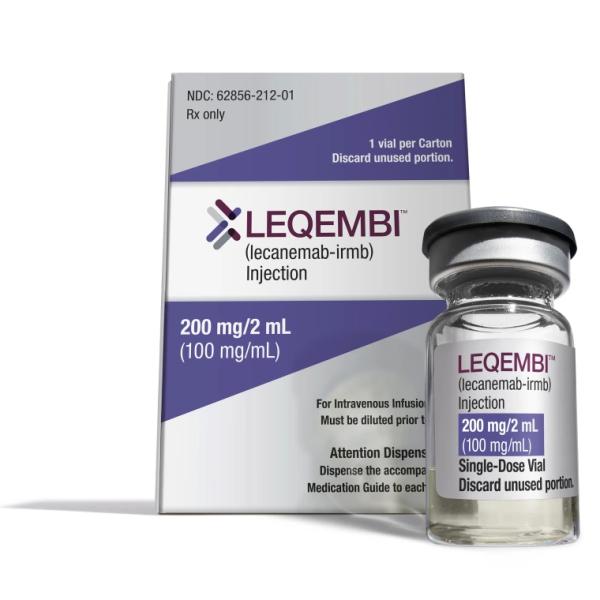Leqembi Side Effects
Generic name: lecanemab
Medically reviewed by Drugs.com. Last updated on Sep 1, 2023.
Note: This document contains side effect information about lecanemab. Some dosage forms listed on this page may not apply to the brand name Leqembi.
Applies to lecanemab: intravenous solution.
Warning
Intravenous route (Solution)
Warning: Amyloid Related Imaging AbnormalitiesMonoclonal antibodies directed against aggregated forms of beta amyloid, including lecanemab-irmb, can cause amyloid related imaging abnormalities (ARIA), characterized as ARIA with edema (ARIA-E) and ARIA with hemosiderin deposition (ARIA-H). Incidence and timing of ARIA vary among treatments. ARIA usually occurs early in treatment and is usually asymptomatic, although serious and life-threatening events rarely can occur. Serious intracerebral hemorrhages, some of which have been fatal, have been observed in patients treated with class of medications.ApoE e4 HomozygotesPatients who are apolipoprotein E e4 (ApoE e4) homozygotes (approximately 15% of Alzheimer's disease patients) treated with this class of medications, including lecanemab-irmb, have a higher incidence of ARIA, including symptomatic, serious, and severe radiographic ARIA, compared to heterozygotes and noncarriers. Testing for ApoE e4 status should be performed prior to initiation of treatment to inform the risk of developing ARIA. Prior to testing, prescribers should discuss with patients the risk ARIA across genotypes and the implications of genetic testing results. Prescribers should inform patients that if genotype testing is not performed they can still be treated with lecanemab-irmb; however, it cannot be determined if they are ApoE e4 homozygotes and at higher risk for ARIA.Consider the benefit of lecanemab-irmb for the treatment of Alzheimer's disease and potential risk of serious adverse events associated with ARIA when deciding to initiate treatment with lecanemab-irmb.
Serious side effects of Leqembi
Along with its needed effects, lecanemab (the active ingredient contained in Leqembi) may cause some unwanted effects. Although not all of these side effects may occur, if they do occur they may need medical attention.
Check with your doctor or nurse immediately if any of the following side effects occur while taking lecanemab:
More common
- Back pain
- blurred or changes in vision
- chest tightness
- chills
- confusion
- diarrhea
- dizziness
- dizziness, faintness, or lightheadedness when getting up suddenly from a lying or sitting position
- drowsiness
- feeling shaky
- fever
- flushing
- general feeling of discomfort or illness
- headache
- joint pain
- loss of appetite
- muscle aches and pain
- nausea and vomiting
- nervousness
- pale skin
- pounding in the ears
- runny nose
- seizures
- shivering
- slow or fast heartbeat
- sore throat
- sweating
- trouble breathing
- trouble sleeping
- unusual tiredness or weakness
Less common
- Cough or hoarseness
- lower back or side pain
- painful or difficult urination
Incidence not known
- Cough
- difficulty swallowing
- dizziness
- fast heartbeat
- hives, itching, skin rash
- large, hive-like swelling on face, eyelids, lips, tongue, throat, hands, legs, feet, sex organs
- puffiness or swelling of the eyelids or around the eyes, face, lips, or tongue
For Healthcare Professionals
Applies to lecanemab: intravenous solution.
General
The most common adverse reactions reported were infusion-related reactions, headache, and amyloid related imaging abnormalities.[Ref]
Cardiovascular
Common (1% to 10%): Atrial fibrillation[Ref]
Gastrointestinal
Common (1% to 10%): Diarrhea[Ref]
Hematologic
Common (1% to 10%): Lymphopenia[Ref]
Other
Very common (10% or more): Infusion-related reactions (20%)[Ref]
Respiratory
Common (1% to 10%): Cough[Ref]
Nervous system
Very common (10% or more): Amyloid related imaging abnormalities (10%), headache (14%)[Ref]
Frequently asked questions
- What are monoclonal antibodies?
- What's the mechanism of action for Leqembi (lecanemab-irmb)?
- Is Leqembi used to treat Alzheimer's?
More about Leqembi (lecanemab)
- Check interactions
- Compare alternatives
- Pricing & coupons
- Drug images
- Dosage information
- During pregnancy
- FDA approval history
- Drug class: miscellaneous central nervous system agents
- En español
Patient resources
Professional resources
Related treatment guides
References
1. Product Information. Leqembi (lecanemab). Eisai Inc. 2023;1.
Further information
Always consult your healthcare provider to ensure the information displayed on this page applies to your personal circumstances.
Some side effects may not be reported. You may report them to the FDA.

